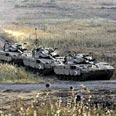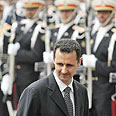


"It only takes four hours," the Austrian officer says with a smile.
The UN troops observe the two countries' lineup of forces on a 50-kilometer (31.05-mile) wide strip – 25 kilometers (15.525 miles) east and west of the Yom Kippur War's ceasefire line.
Jilke was appointed to the role on February 2007. This has provided him with the unique ability to become familiar with the two sides of the border.
Contrary to the Israeli view, which regards Syria as a strategic threat, Jilke says that actually Israel bears the brunt of the responsibility for causing the current tensions.
"The tensions on the Golan Heights have not been so high in years. I am worried," he says.
Room for concern
Jilke is the end-product of a life-long Prussian military education. He is the third generation of a family of officers, and takes pride in the fact that his grandfather served in the royal guard of German Emperor Wilhelm II, while his other grandfather fought in elite forces of the Austro-Hungarian army.
At the age of 58, he still appears slim and muscular. His posture erect, the uniform neatly ironed, his hair combed and his wording accurate and meticulous– he epitomizes the ultimate officer.
This is not his first time on the Golan Heights. As a young lieutenant, he volunteered to serve in the UN forces, and was one of the first soldiers to arrive to maintain the shaky ceasefire on the Golan Heights, when UNDOF was established in 1974.
His return to the area as commander of the same force can be seen as a closure. He is determined to maintain the current state of calm, and his concerns motivated him to grant Ynet a special interview.
Jilke is well-aware of the general concern in Israel and of the remarks made by officers and politicians regarding the Syrian arms purchases and increased state of readiness, but he is mainly concerned by Israel's actions.
According to him, the Syrians have not stationed any special forces in the area next to the border that would be capable of launching a surprise attacking against Israel.
"On the Syrian side I do not notice any unusual preparations," he says. "On the Israeli side, however, we see intensive activity… Israel's right to defend itself is self-understood, but its current activities do not contribute to the efforts to diminish the tensions in the region… The actions on Israel's side are not very helpful when it comes to calming the Syrians down."
The UNDOF commander is not worried by Syria's rearmament, although his soldiers would be the first victims should a war break out.
"We must remember that the antitank and antiaircraft missiles Syria is purchasing are not offensive weapons. Syria is renewing its weapon inventory like any other army in the world. I do not view this as something unusual," he says.
In light of the balance of power, Jilke estimates that "the chances the Syrians will surprise Israel are very low, and in any case, the Israelis have prepared and positioned themselves in a way that guarantees their advantage and deny the Syrians any gains."
'Syrian trucks barely work'
UNDOF sources, who likened the Golan to a "crowded military camp", told Ynet of the poor state of Syrian forces. "Their trucks barely work, their tanks are rusty," sources said.
"In Syria, you see three soldiers with one shovel trying to prepare trenches in the hard rocks of the Heights. On the Israeli side, we see bulldozers massively altering the terrain," they explain.
According to some sources, the hard training schedule of the IDF has made it difficult for them to keep contact with Israeli commanders. "Your chief of staff works the officers day and night, they have almost no time to meet with us," UNDOF sources said.
Upon his return to the area about six months ago, Jilke found a very different situation than that which he had left. Up until several years ago, the Syrian side of the border was abandoned, the villages nearly empty.
According to UN figures, only 5,000 people resided in the area controlled by UNDOF in 1974. Since Bashar al-Assad came into power, Syria began to repopulate the scattered strip, which now houses nearly 100,000 residents.
The growing number of citizens poses a problem for UN forces, which have become smaller relative to the amount of people they inspect.
'Situation at the border could erupt'
Jilke claims that since March, Israel has changed the rules. The "Alpha Line" limits the deployment of IDF soldiers to the east. West of the line, the IDF has erected a security fence and a patrol road.
In some areas, the fence is several hundred meters away from the Alpha Line. Through the years, Syrian shepherds and farmers have begun to use the land, which technically is under control of the army, even though IDF soldiers did not use to venture east of the fence.
Since March, however, Israeli troops renewed their patrol between the fence and the "Alpha line", blocking access to Syrian farmers who had worked the land until then. On three occasions, IDF soldiers arrested and questioned Syrian citizens for several hours.
According to Jilke, the situation at the border could potentially erupt. "I'm worried. In light of the tense atmosphere that has been created here, a little incident could ignite a bushfire in an instant," he says.
However, Jilke says he is comforted by his assessment that "neither of the sides has the intention to start a conflict".
Despite the image of Syria as a warmonger, Jilke said the local residents and the soldiers posted in the area wanted calm.
"When you ask a young Syrian soldier what he thinks of Israel, he won't tell you that he wants to fight in order to return the Golan to his homeland. Quite the opposite; he will say that he is very curious and would like to visit Jerusalem and Tel Aviv as a tourist, to see how people live here.
"This came as no surprise to the seasoned general: "The deeper you delve into the region's history, you learn that people of all origins usually got along much better with each other than their governments," he concludes.















